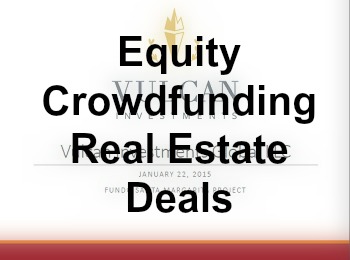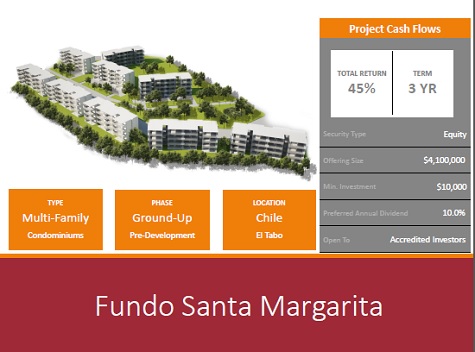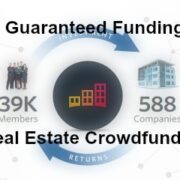Equity Crowdfunding Real Estate Deals
Equity crowdfunding real estate has become a huge opportunity for both investors and developers.
Today’s campaign review comes from another equity crowdfunding campaign on EquityNet. Vulcan Investments Global LLC has raised just over a million of its $4.1 million goal for two real estate development projects in Chile. I talked to the company’s Chief Executive Officer, Kal von Gal, about his experience in crowdfunding.
The interview provides some great detail into how real estate crowdfunding works for both developers and investors as well as some useful tips.
First, tell us a little about yourself.
My path into finance and ultimately crowdfunding has been anything but traditional. At the turn of the millennium, I worked in construction which led to creating a construction company where I built single- and multi-family residences until I sold that company in 2007 just before the housing bubble burst.
From there I earned a degree in Finance and ultimately created an investment advisory firm, Vulcan Investments LLC. In an effort to take advantage of crowdfunding in entirely new markets, I recently expanded the firm with a wholly-owned subsidiary to take the concept of real estate equity crowdfunding into international markets.
What makes real estate equity crowdfunding different?
When most people think of crowdfunding they think of rewards-based crowdfunding for startups on sites like Kickstarter and Indiegogo. Real estate equity crowdfunding is different in that it’s a type of private placement investment in which investors receive an ownership stake in a business or fund.
In that sense it is much similar to what might be called a traditional investment in that you will often receive a preferred dividend on your investment along with an ownership stake in the underlying company and a chance to participate in profit sharing.
It should be considered with as much seriousness as any other investment that you would add to your portfolio. Along with purchasing agreements and other legal documents, there is an additional layer of due diligence and investors must be “accredited” (individuals with a net worth exceeding $1 million, earning more than $250,000 per year).
The campaign is similar to our review of the equity crowdfunding for Ascenergy on Monday which is raising $5 million for production at its Texas oil wells. For the crowdfunded equity, the company is offering investors participation in royalty-rights to future sales.
How does Real Estate Crowdfunding Work for Investors?
New crowdfunding laws have opened up a whole new opportunity for investors and portals like RealtyShares. Unlike real estate investment trusts (REITs) where investors only get ownership in a fund, real estate crowdfunding gives you direct ownership in investment property.
Properties are professionally-managed so you don’t have to worry about the headaches of direct ownership but returns are higher because you don’t have fund expenses. Most real estate crowdfunding portals charge less than 2% in annual fees and returns are paid out on a monthly or quarterly basis.
Most importantly, investing in individual properties across the country and in different property types gives investors the diversification they need. Check out this link for more information about investing on RealtyShares.
I follow several real estate platforms to get access to as many deals as possible. It costs nothing extra to have an account on more than one crowdfunding site and you’ll be able to invest in more deals.
PeerStreet offers investment in real estate debt on commercial property. Since the debt is back by the property, it’s much safer than equity investment but still targets returns between 8% and 12% on an annual basis. I use PeerStreet to balance out the risk in my equity investments on other platforms.
What is your equity crowdfunding campaign about?
My current equity campaign is for a condominium development project located in the beachside town of El Tabo, Chile. It provides an opportunity for investors to add diversification to their portfolio and take advantage of higher yields that only a foreign market has to offer. The return on investment is realized through both an annual dividend and a share of net income once the project is completed and sold.
Did you try to raise funding before crowdfunding?
I’ve not yet completed a crowdfunding campaign though I’ve been following the concept and learning the process ever since the SEC established rules and regulation for Title II of the JOBS Act.
What has surprised you most about running an crowdfunding campaign for real estate?
I’m surprised at the slow adoption of rules and regulations by regulatory agencies, such as the Securities and Exchange Commission. The JOBS Act was signed by President Obama in 2012 and the SEC is still in the process of creating rules and regulations for Title III which will allow non-accredited investors to participate in equity crowdfunding.
Title III technically has been passed but until the SEC establishes some type of regulation there will still be a lot of “grey” areas out there as to what is and isn’t allowed in terms of marketing, structure, and precisely who can or will be able to participate as an investor. It will be interesting to see how it all develops over time.
I want to thank Kal for taking the time to share his experience in equity crowdfunding. If you are an accredited investor, click through to the link provided and check out the crowdfunding campaign and related documents.



